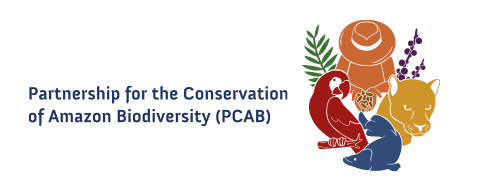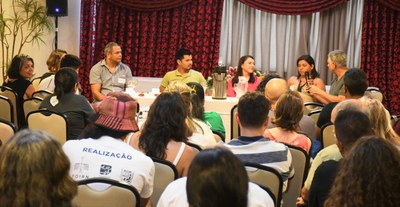Sustainable Value Chains Closing Ceremony
December, 2022 / January, 2023 - IEB Partners from all over Brazil met in Brasilia on December 7-9 for the Final Integrating Seminar of the Sustainable Value Chains project. The event reflected on the challenges and lessons discovered over the past eight years. The project reached 40,000 people and stretched out over 2 million hectares in four states of the Brazilian Amazon.
The Sustainable Value Chains project focused on four high-value sociobiodiversity products that have been historically managed by Indigenous and traditional communities: açaí, Amazon nuts, pirarucu, and community- and family-managed wood.
"The project lasted for eight years, during which we saw significant changes at the federal, state, and municipal levels of government, in addition to a pandemic that practically paralyzed all our activities for nearly two years. The transformations we have seen as individuals, organizations, and territories are undeniable," said Pedro Constantino, USFS, Program Specialist.
Up to 1,200 people were trained yearly to enhance their roles in natural resources management and the value chain programs. In 2021, 71 community-based organizations received training to develop sustainable businesses in the Amazon.
The Beruri Farmers Association (ASSOAB) benefited greatly from the project. Their community-based mill is the first to be certified to export Amazon nuts by the Ministry of Agriculture. It is the second largest source of income for the residents of Beruri, in the state of Amazonas, placing it second only to the local government. ASSOAB is now led by the first woman President, Sandra Amud. As a result female leadership and engagement are key aspects of ASSOAB’s work, and 40% of its full-time employees are women.
The important roles women play in the businesses and communities the project serves were highlighted throughout the meeting. Shirley Arara, describes how they lobbied their Chief to include women in income-generating jobs. "Talking about women's work means talking about the economy, about care," she pointed out. Women now account for 48% of the people receiving socioeconomic benefits from the Sustainable Value Chains project.
For Andreia Bavaresco, the event should be seen as a great success: "We have implemented a territorial and environmental management strategy for protected areas in the Amazon. Thousands and thousands of hectares. Keeping the forest standing and preserving the traditional ways of life adopted by forest peoples. This gives us a lot of energy to keep going. Let's move forward together, strong, creative, and resilient." On behalf of the IEB, Andreia thanked USAID for its partnership, trust, and freedom to innovate and implement their work. "Thank you for your sensitivity," she concluded.
"We have a success story to tell. We should all feel very proud. We have established partnerships with the private sector, with civil society, and an essential partnership with the federal government. These diverse partnerships allow us to experience this moment of celebration," said Catherine Hamlin, Environment Director at USAID Brazil.
Celebration - The luncheon featuring pirarucu as the main course was a major highlight. Chefs Fabiana Pinheiro and Roberta Azevedo, developed a special menu for the event. It showcased the achievements of the Gosto da Amazônia [Taste of the Amazon] brand. Under the auspices of the project Gosto da Amazônia brand collective brings managed pirarucu to the market, ensuring species preservation and a fair price for fishers’ products.
Fabiana was very involved with the project and regularly creates different recipes with the pirarucu. Public interest in the pirarucu has grown exponentially, and it is now the best-selling fish at her trendy restaurant in Brasília. “Today I sell more pirarucu than filet mignon!” The two chefs traveled to the community of São Raimundo, in the Médio Juruá region, in the state of Amazonas, to learn about the pirarucu and understand the entire process from lake plate.
Since launching of the Gosto da Amazônia brand three years ago, pirarucu has reached new markets, including the cities of Rio de Janeiro, São Paulo, Belo Horizonte, Brasília, Recife, Minas Gerais and São Paulo.
Learn more here.



